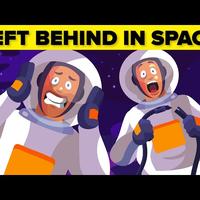The Man That Was Left Behind In Space
On August 19th, 1991, Sergei Krikalev was on top of the world - literally.
The cosmonaut was enjoying the view from his “home-away-from-home” in the Mir space
station, where he could catch a glimpse of natural wonders like the Great Barrier Reef,
see ancient masterpieces like the Pyramids of Giza and observe nature's power by tracking
hurricanes.
But what Sergei couldn't see From his vantage point 200 miles above the earth was the history
that was unfolding below him in the streets of his home country, the Soviet Union.
He didn't know it at the time, but he was about to become the last citizen of the USSR
- the man who was left behind in space.
As the tanks rolled through Moscow's Red Square during the infamous August Coup, Sergei
Krikalev and his comrade Anatoly Artsebarsky were hundreds of miles above the earth, halfway
through what was supposed to be a 5 month mission.
While the cosmonauts were up in space, the world as they knew it was crumbling below
them, and Krikalev would soon find himself forgotten, left behind in space by a country
that no longer existed, with no clue as to when he would be able to go home, or what
he would find there when he did.
Sergei Krikalev was born on August 27th, 1958 in the city of Leningrad in the Soviet Union.
He received his Mechanical Engineering Degree from Leningrad Mechanical Institute in 1981,
and after graduation, found work testing space flight equipment, developing space operations
methods and working ground control for space missions.
By the time he was in his late 20s, Sergei's impressive skills as a pilot had earned him
a place on the USSR's national aerobatics team.
He earned his cosmonaut wings in 1986 after playing a key role on the ground control team
during the in-orbit rescue mission of the Salyut 7 space station in 1985.
On a spring day in May 1991, Sergei Krikalev and Anatoly Artsebarsky arrived at Baikonur
Cosmodrome, a Soviet launch complex located in the heart of present-day Kazakhstan.
Baikonur had already been the site of some truly historic moments in space travel - the
world's first satellite, Sputnik, was launched there in 1957, as well as future missions
that sent the first animal, Laika the dog, and the first human, Yuri Gagarin, into space.
This was supposed to be nothing but a routine mission, but it would end up being one of
the most historic missions ever launched at Baikonur.
As Krikalev and Artsebarsky stepped off the bus, they honored a tradition started by Gagarin
before his historic 1961 flight by urinating on the bus's tires before making their way
to the launch pad.
This would be Krikalev's second space mission, and he was looking forward to returning to
Mir.
The launch went off without a hitch, but as the craft approached the space station, the
onboard targeting system suddenly failed.
Helen Sharman, a British astronaut on the mission, was terrified, but she recalled that
Krikalev remained calm and expertly guided the craft to a flawless docking, delivering
the crew to Mir safe and sound.
Mir Space Station had a reputation for being cramped, smelly and noisy.
It was small - no bigger than a few RVs arranged end-to-end - and it was filled with the racket
of pumps, fans and other machinery.
A host of stowaway microorganisms lent it a distinct locker-room odor.
Despite the less-than luxurious conditions, Krikalev always said that taking a mission
to Mir was like going home.
He loved being in space - the feeling of weightlessness, the sense that he was flying, and of course,
the incredible views.
“Every spare moment, we tried to look at the Earth”, Krikalev has said.
While other astronauts passed the time in space reading, Krikalev spent it looking out
the window, searching the planet for places he'd been or had heard about.
But from 200 miles above the earth, he couldn't see that the country he called home was starting
to crumble beneath him as he looked on from above.
8 days after reaching Mir Space Station, the rest of the crew returned to Earth, leaving
Krikalev and Artsebarsky alone in outer space to complete their mission.
The duo planned to complete a total of 6 space walks to repair and upgrade the station, but
less than halfway through their planned 5-month mission, in August 1991, everything changed.
“For us, it was totally unexpected,” Krikalev recalled.
“We didn't understand what had happened.”
What had happened was nothing short of the total collapse of the once-mighty Soviet Union.
Years of President Mikhail Gorbachev's policies of decentralizing control across the USSR
had emboldened many states to begin demanding independence from Soviet control.
On August 18, 1991, hard-line opponents of these reforms staged a coup in an attempt
to restore Soviet control.
Tanks rolled through Moscow's Red Square, and the streets were filled with violence
and protests.
After 3 days, realizing that they lacked support from the military and the public, the coup
was called off and order was restored, but the Soviet Union's days were numbered.
Over the coming weeks and months, Soviet states would declare their independence one by one.
Kazakhstan was one of the first to do so, which posed a major problem for Krikalev and
the Soviet space program, since the Baikonur Cosmodrome was now under the control of the
new government of the Republic of Kazakhstan.
To appease the new government, Moscow offered a spot on the next shuttle to Mir to a Kazakhstani
cosmonaut - a seat that should have belonged to the more experienced flight engineer who
was scheduled to replace Krikalev.
Sergei would have to remain at Mir until further notice - he was officially stranded in space.
On October 2nd, 1991, near what should have been the end of Krikalev's 5 month mission,
3 new crew members arrived at Mir.
None had the skills or experience necessary to replace Krikalev, but a kind Austrian cosmonaut
did come bearing gifts - fresh lemons.
One week later, Artsebarsky returned to Earth, leaving Krikalev and his new partner alone
at Mir, with no end date to his mission in sight.
The Cold War and the Soviet Union both came to an end on Christmas Day, 1991, when Mikail
Gorbachev resigned due to health reasons.
The mighty USSR splintered into 15 separate nations, and the country that had sent Krikalev
into space was no more.
The Russian government was facing hyperinflation and severe cash flow problems, and began selling
off seats on shuttles to the space station to raise funds - at one point, they even considered
selling Mir itself.
Despite the dangers to his health and the uncertainty around his future, Krikalev remained
fully committed to his mission.
The long-term effects of space travel are not well understood today, let alone in the
early 90s, though even back then it was known that prolonged time away from earth can lead
to an increased risk of cancer, cataracts, nasal congestion, muscle atrophy, bone loss,
infection, immune problems and a whole host of other health and psychological issues.
The Mir Space Station was equipped with a Soyuz capsule which Krikalev and his comrade
could have used to escape at any time - but Krikalev knew that if he left Mir, it would
be the end of the space station, so he resolved to stay until he could be replaced.
Talking to his wife, Elena, helped to keep his spirits up while he was away.
The two had gotten to know each other over the radio during his previous space mission,
when she was part of the ground control crew, and they were now married with a 9 month old
daughter.
They were fortunate to be able to speak frequently, but tried not to talk about anything negative
during their talks.
Finally, on March 25, 1992, Krikalev finally got the news he'd been hoping for for nearly
a year - he was finally going home.
When he landed near the city of Arkalyk in the now independent Republic of Kazakhstan,
he had to be helped down from the capsule by 4 men.
According to witnesses, he was “pale as flour and sweaty, like a lump of wet dough.”
Krikalev had spent 312 days in space, had circled the earth 5,000 times, set a world
record for the longest stint in space at that time, and had come home to an entirely changed
world.
Years later, when he spoke with a documentary crew, Krikalev recalls what the experience
of returning to earth was like for him: “It was very pleasant in spite of the gravity
we had to face.
But psychologically, the load was lifted.
There was a moment.
You couldn't call it euphoria, but it was very good.”
It would take him weeks to begin to feel normal again, and months to recover fully from his
ordeal.
If you thought Krikalev would have been happy to spend the rest of his days safely on terra
firma, well, you couldn't be more wrong.
Before long he was back “at home” in space, and would go on to rack up a total of 803
days in space over the course of his long and impressive career.
If you thought this video was fascinating, be sure and check out our other videos, like
this one called “Why Soviet Russia Invented A Clear Coca Cola”, or perhaps you'll
like this other video instead.
As always, thanks for watching, and don't forget to like, share and subscribe!
See you next time!

